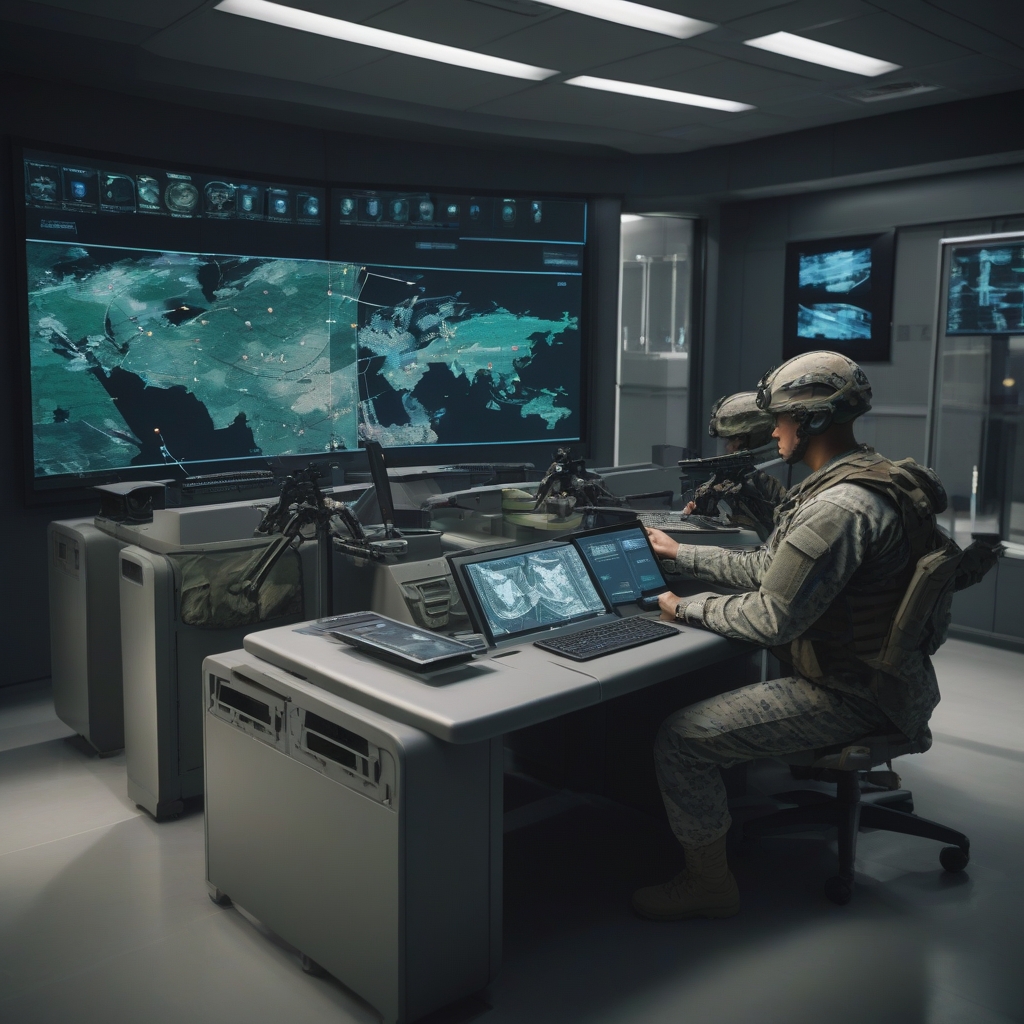Unlocking the Future: AI-Driven Military Advancements
As the world stands on the brink of a technological revolution, artificial intelligence (AI) is rapidly becoming the cornerstone of modern military operations. Transforming everything from strategic planning to real-time battlefield decisions, AI is reshaping the landscape of defense with unparalleled precision and efficiency. This integration not only enhances existing capabilities but also unveils new possibilities for military forces worldwide.
Revolutionizing Command and Control
AI’s impact is profoundly evident in command and control systems. These systems are the brain centers of modern militaries, orchestrating complex operations with a degree of finesse unimaginable a few decades ago. The integration of AI into these systems provides definitive advantages:
- Data Processing: AI systems can process vast amounts of information in real time, sifting through layers of data to help decision-makers gain clearer situational awareness.
- Predictive Analytics: The technology enables predictive analytics that can foresee potential threats and provide strategic recommendations, supporting proactive military tactics.
- Automation: By automating routine tasks, AI allows military personnel to focus on critical decision-making, increasing the overall efficiency of operations.
Enhancing Situational Awareness
AI-powered military operations leverage advanced machine learning and computer vision algorithms to offer enhanced situational awareness. This capability is pivotal in modern warfare, where information dominance is crucial.
- Real-Time Surveillance: AI enables the continuous monitoring of conflict zones through drones and satellite imagery, providing a constant stream of data.
- Target Recognition: With AI-assisted systems, target recognition becomes faster and more accurate, enabling forces to effectively neutralize threats while minimizing collateral damage.
- Environmental Analysis: AI can assess terrain and environmental conditions, giving commanders insights into how various factors may affect mission success.
Streamlining Logistics and Resource Allocation
In operations where timing and resource management are critical, AI serves as a force multiplier. The capability to predict logistical needs and optimize supply chains leads to unprecedented efficiency.
- Predictive Maintenance: AI systems can predict equipment failures before they occur, ensuring that machinery is operational when needed and reducing downtime.
- Inventory Optimization: Smart algorithms track and manage inventory in real-time, leading to efficient resource allocation and minimizing wastage.
- Transport Coordination: Sophisticated scheduling and routing systems powered by AI ensure timely delivery of supplies and reinforcements, crucial during high-stakes missions.
Autonomous Systems and Robotics
Autonomous systems represent one of the most groundbreaking applications of AI in military operations. These systems are not only capable of conducting missions independently but also excelling in high-risk environments.
- Unmanned Aerial Vehicles (UAVs): Equipped with AI, UAVs can perform reconnaissance missions, gather intelligence, and engage targets without direct human intervention.
- Ground Robots: These machines handle explosive ordnance disposal and support troops in challenging terrains, reducing the risk to human soldiers.
- Naval Applications: AI-enhanced autonomous ships and submarines can carry out surveillance and engage in complex maneuvers autonomously.
Cybersecurity in Military Operations
In an age where cyber threats are as significant as physical ones, AI bolsters cybersecurity measures, ensuring that military networks are protected from hostile entities.
- Threat Detection: AI can detect anomalies and potential breaches within networks, preventing unauthorized access and data theft.
- Incident Response: In the event of an attack, AI systems can automate response protocols, minimizing downtime and mitigating damage.
- Network Defense: Advanced algorithms continuously adapt to evolving threats, providing robust defense mechanisms against sophisticated cyber attacks.
Challenges and Ethical Considerations
While AI presents significant advantages, its integration in military operations is not without challenges. Ethical concerns and potential risks must be navigated with cautious consideration.
- Decision-Making: The delegation of decision-making to machines raises questions about accountability in situations involving life and death.
- Bias and Reliability: Potential biases in AI algorithms could lead to unintended consequences on the battlefield.
- Autonomy and Control: Ensuring that AI systems remain under human control is vital to prevent misuse or unintended escalation.
The Road Ahead
The integration of AI in military operations is poised to revolutionize armed forces globally, enabling them to conduct operations with greater precision, safety, and speed. As these technologies continue to evolve, they will pave the way for new doctrines and strategies, reshaping the dynamics of modern warfare.
As military forces embrace these advancements, a balanced approach must be maintained to harness the full potential of AI while addressing the ethical and operational challenges it presents. This dual focus ensures that AI-enhanced military operations remain not only effective but also aligned with broader humanitarian and ethical standards.

Leave a Reply